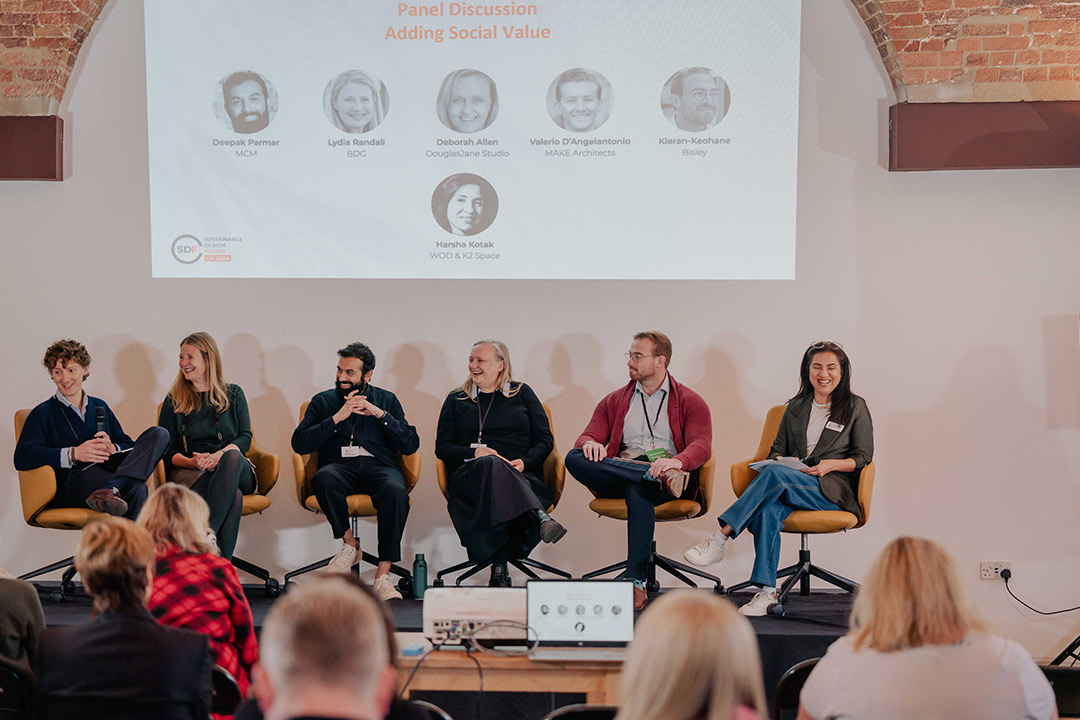The Sustainable Design Collective owes a huge debt of gratitude to all of the sponsors and supporters at last week’s Sustainable Design Forum. The event was an outstanding success, and the enthusiasm was palpable as the day progressed through the comprehensive agenda of panel discussions, presentations, and workshops.
Covering a truly comprehensive range of topics, members of SDC participated in a range of discussions from the importance of social value through to the ‘pros and cons’ of carbon measurement. Many colleagues within the workplace design community commented on the practical advice and information provided by each of the ‘How to’ workshops covering ‘promoting sustainability to clients’ and ‘understanding supply chains’.
Once again, the Materials Lab – curated by The Furniture Practice – proved to be extremely popular with visitors able to ‘touch and feel’ many different, more sustainable alternatives. The ‘Lab’ area also provided a space for practical workshops including material specification, chemical content, and wellbeing.
There was a poignant silence during the brief interlude to read SDC’s ‘Letter to the Earth’. A letter of acknowledgement of the harm we have inflicted on the planet and the commitment to change.
The atmosphere changed to excitement as we moved onto the evening’s Sustainable Design awards presentation. The culmination of the day’s activities, the ceremony provided the opportunity to applaud achievements and commitments to greater sustainability across fit-out projects, innovations, and new products.

Once the day’s activities concluded, attention turned towards the Sustainable Design Awards 2024…
Following a humorous and entertaining introduction by Works magazine’s editor, Mick Jordan, the evening’s programme of events was hosted by the ‘power couple of design’, Gurvinder Khurana of M Moser and Associates with Align Interior Architecture & Design’s founder, Nigel Tresise.
The Awards are organised by the Sustainable Design Collective and designed to champion ‘best practice’ and highlight innovations leading to greater sustainability within the office workplace. Each entry was independently judged by a panel of 10 industry experts against specified criteria.

Projects: Presented by Julie Lecoq, Associate Strategy at Unispace, the winner of this fiercely contested category was BDP with Rype Office for the 5,577 sq. ft Cat B fitout project for Latimer Developments in London, SE1.
The team successfully demonstrated a determined commitment to greater sustainability within all design decisions, including the ambition to optimise and use existing materials and fittings wherever possible.
The judges were impressed with the principles used: build nothing or less; minimise waste; and specify for low carbon. “An amazing example of maximising the existing space first then introducing reclaimed and refurbished materials before looking at new, and even then, choosing low carbon and healthy materials,” commented the judges.
The runner-up award was presented to Basha-Franklin for its project with Myo, the flexible office brand from Landsec. The interior fit-out for the 47,500 sq.ft workspace over three floors at the landmark building, One New Change, was driven by wellbeing, sustainability and adaptability. The judges recognised the strong commitment to sustainability that went far beyond recycling and circularity, as well as considering neurodiversity as part of the design ethos and narrative.
The short-listed entries for this category were K2 Space for DTRE’sexpansion and relocation project in London W1; and Habit Action’s 55,000 sqft, CAT A and B BREEAM accredited, project in Hemel Hempstead, Hertfordshire for Atlas Copco Group.

Innovation: The Innovation category, presented by Kim Gault, Senior Sustainability Consultant at Cundall, recognises developments and initiatives that facilitate greater progress in sustainability.
The winning entry was presented to Carbon Efficiency Rating’s new software platform of integrated digital services for circular economy strategy, material evaluation, cost analysis, lifecycle assessment, and product traceability through to a digital product passport (DPP).
The runner-up award went to Maconda Solutions for MyUpcyclea. This innovation allows tracking of the full cycle of a building from design to the construction and in-use phases all the way through deconstruction.
The winners were selected from the short-list including FUTURE Design for the work championing reuse within the lighting industry; and Johnsons Business Moves’ Assets 4 Change programme, designed to maximise the life of IT, furniture, fittings and fixtures and includes investment in the ‘Back on their feet’ campaign.

Products: The evening’s proceedings concluded with the announcement for the products category by award winning product designer, Phideas Leonida.
The winner of this year’s prize was Modus Furniture for its sectional seating solution, Maluma. The judges gave high scores across the board for the thought and detail considered for Maluma’s design in terms circularity and carbon impact.
There was a tie for the runner-up awards so two companies were selected. Graphenstone Paint was announced as the first recipient. The judges noted Ambient Pro+ paint will actually absorb approx. 5Kg CO2 during the 30-60 day curing phase.
The second winner was SeaCo Designsfor its compostable biomaterial. Used for a wide range of single use applications, such as 3D print, SeaCo is made from sustainable harvested red seaweeds and can be coloured using natural dyes.
The finalists also included Allsfar for Fika, a mycelium and hemp acoustic wall tile. As well as creating acoustic comfort, Fika is red list, VOC, and aldehyde free.

A wonderful and inspiring day – thank you to everyone who took part.

